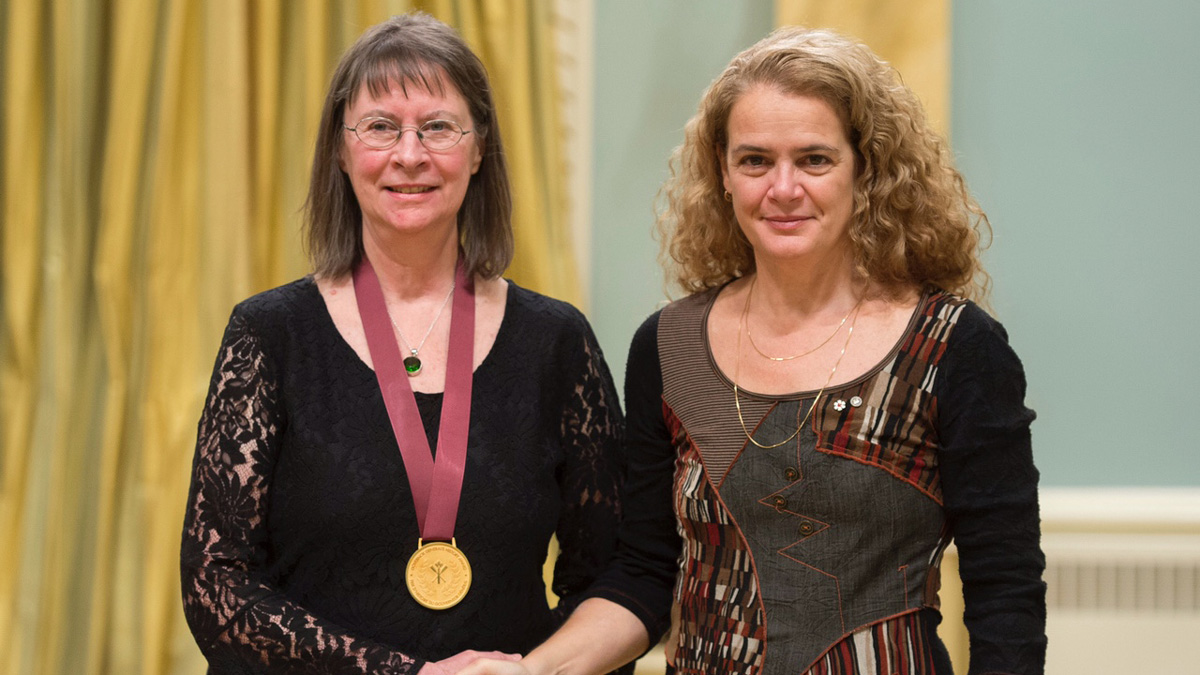 MCpl Vincent Carbonneau
MCpl Vincent CarbonneauFor University of Alberta history professor Sarah Carter, it was a paper by a student that inspired the topic of her latest award-winning book.
Carter’s book, Imperial Plots: Women, Land, and the Spadework of British Colonialism on the Canadian Prairies, focuses on the experience of women in the prairies during the late 1800s and the denial of their property rights. Her work was recognized on November 22 when she was awarded the Governor General’s History Award for Scholarly Research, also called the Sir John A. Macdonald Award, presented by Governor General Julie Payette.
Carter will be talking about her book on Thursday, December 7 in Humanities Centre L1 at 4 p.m..
The award-winning book focuses on homesteading, a legal practice where immigrants to Canada could purchase land for farming purposes, and how this practice excluded women. New settlers to Canada could buy 160 acres of land for $10, and were allowed to keep the land after three years of successfully living on it. While women were allowed to buy land in the United States, the Canadian government wanted to limit the role of women to the household. The only way women in Canada could purchase land through the homestead system was if they were widowed and had children.
According to Carter, only 1 per cent of the land available for homesteading in western Canada went to women.
“The authorities did not want women to have options outside of marriage,” she said. “Immigrant settler women were welcomed as domestic servants and very little else.”
While women on the prairies did campaign for their property rights, Carter said they aren’t the intrepid pioneers some may make them out to be. Many of these women were British, and used racist arguments for their right to own land as a way to keep out immigrants from Eastern Europe, as well as African Americans, Carter said.
“I would love to have celebrated these women as intrepid and courageous, but they do lead this extremely troubling campaign in which they’re asking for equality for a few people,” she said.
Carter first heard of the homesteads for women movement through an “amazing” paper that was written by an undergraduate student when she was teaching her first western Canadian history class at U of C in 1992. Her book contains an acknowledgement to the student.
“I think what’s really interesting is that we do learn so much from our students,” she said. “So I filed it away and thought ‘that’s amazing.’”
Hailing from Saskatoon, Carter’s fascination with history in the prairies comes from her own family, with her great-great grandparents being homesteaders in Manitoba. Her “obsessions” with race and gender stem from her experience studying history which she says was a conservative and male-dominated profession in the 1970s.
“We had no Indigenous history at all. I had no women’s history at all. None, absolutely none. And not even when I was a PhD student,” she said. “These were topics that I was interested in and I was extremely frustrated that I couldn’t learn anything about them.”
Carter is also one of four Henry Marshall Tory Chairs at the U of A, a role that focuses less on teaching and more on research compared to other professors. She said it was the position that allowed her to further pursue her research in prairie history, leading to the writing of her book.
As for winning the history award, while Carter is “delighted and honored,” she is aware of irony of winning an award named after John A. Macdonald, whose policies have been described by the Elementary Teachers Federation of Ontario (EFTO) as the “architect of genocide against Indigenous Peoples.” But she predicts the name of the award will change eventually.
“It would not seem particularly welcoming to have an award named for Sir John A., not just to Indigenous scholars but to others,” she said.




